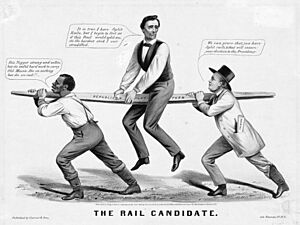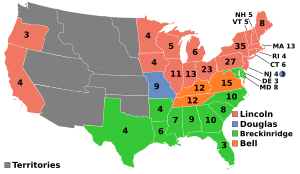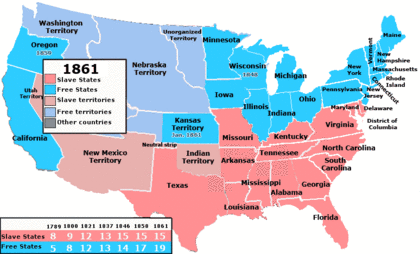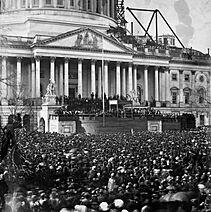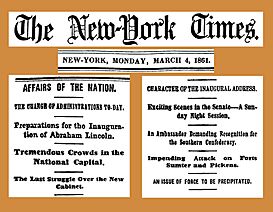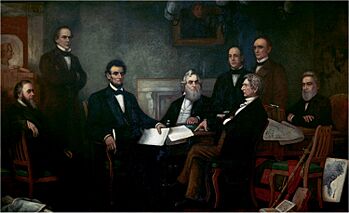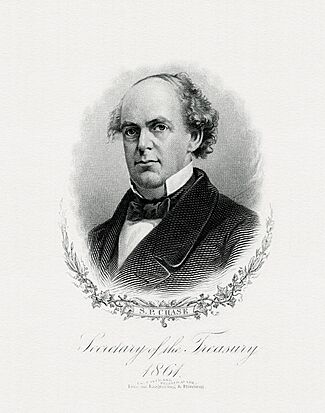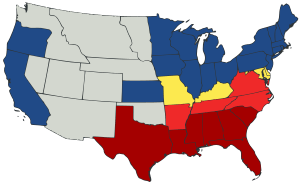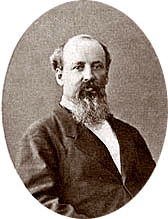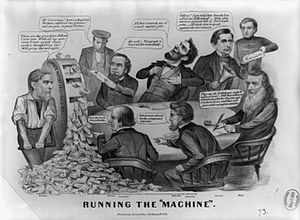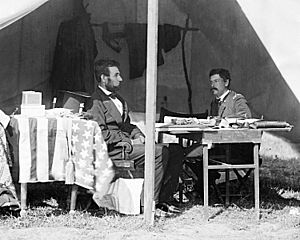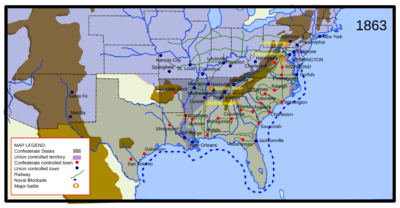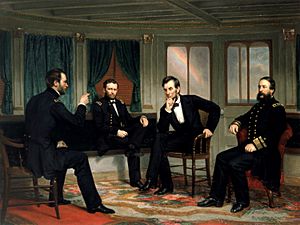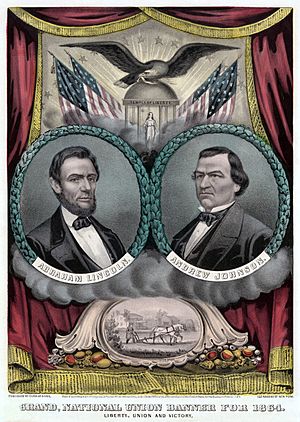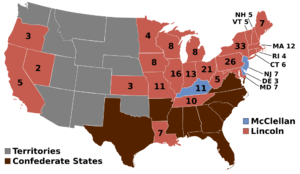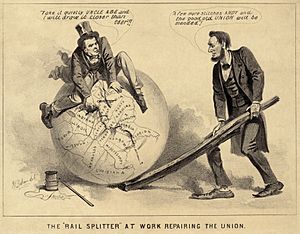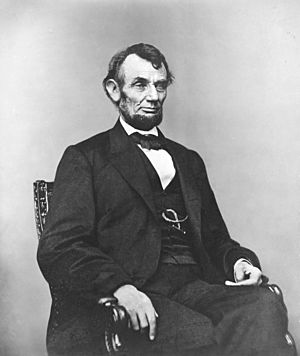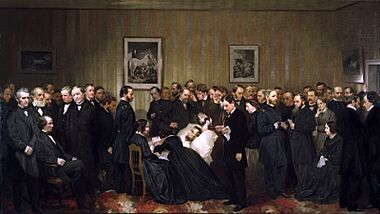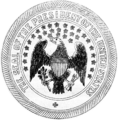Presidency of Abraham Lincoln facts for kids
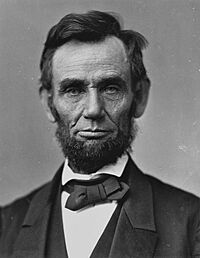 |
|
Quick facts for kids
Presidency of Abraham Lincoln
|
|
|---|---|
| March 4, 1861 – April 15, 1865 (Assassination) |
|
|
|
| Cabinet | See list |
| Party | Republican (1861–1864) National Union (1864–1865) |
| Election |
|
| Seat | White House |
|
← James Buchanan • Andrew Johnson →
|
|
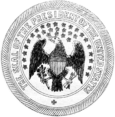 |
|
| Seal of the president (1850–1894) |
|
Abraham Lincoln was the 16th president of the United States. His time as president began on March 4, 1861. It ended when he passed away on April 15, 1865, just a short time into his second term. Lincoln was the first president from the Republican Party. He successfully led the Union to victory in the American Civil War. This war was the main event of his presidency and led to the end of slavery in the United States. After Lincoln's death, his Vice President, Andrew Johnson, became president.
Lincoln became president after the 1860 election. He won the most votes, even though there were four candidates. Most of his support came from the Northern states. People in the Southern states generally did not support the Republicans. Lincoln, who had been a Whig, ran on a promise to stop slavery from spreading into new territories. His election was a major reason why the Civil War began. Once he was president, Lincoln refused to let Southern states leave the Union. The Civil War officially started just weeks after he took office, with an attack on Fort Sumter in the South.
During the war, Lincoln faced many challenges. He was the commander-in-chief of the army. He made tough decisions, like temporarily stopping the right to habeas corpus in Maryland to keep order. He also started the first military draft. After some early defeats, Lincoln found a strong leader in General Ulysses S. Grant. Grant led the Union to important victories. In 1863, Lincoln issued the Emancipation Proclamation. This declared that millions of enslaved people in Confederate areas were free. In 1865, he helped pass the Thirteenth Amendment, which made slavery illegal everywhere.
Lincoln also passed important laws for the country. These included the Homestead Acts, the Morrill Land-Grant Act, and the Pacific Railroad Acts. He was re-elected in 1864 with wide support. Just months later, General Grant's army ended the war by defeating General Robert E. Lee. Lincoln's death in April 1865, shortly after the war ended, meant others had to finish rebuilding the nation.
Today, Lincoln is remembered as a hero. He is seen as the person who freed enslaved people and saved the Union. Many historians and the public consistently rank him as one of America's greatest presidents.
Contents
- Lincoln's Election: The Road to Presidency in 1860
- The Transition Period: Secession Crisis
- Lincoln's First Inauguration
- Lincoln's Administration: Building a Team
- Judicial Appointments: Shaping the Supreme Court
- The American Civil War: A Nation Divided
- Slavery and Reconstruction: A New Nation
- Other Domestic Issues and Reforms
- Foreign Policy: Keeping Europe Neutral
- Assassination: A Tragic End
- Historical Reputation and Legacy
- Images for kids
- See also
Lincoln's Election: The Road to Presidency in 1860
Lincoln, a former congressman from Illinois, became a leading Republican candidate. This happened after he nearly won a Senate election in 1858 against Stephen A. Douglas. Lincoln worked hard in 1859 and 1860 to gain support. His famous Cooper Union speech was very popular with important people in the East.
Lincoln took a middle-ground stance within his party. He was against slavery spreading into new territories. However, he accepted that the government could not end slavery in states where it already existed. At the Republican convention in May 1860, Lincoln was nominated for president. Hannibal Hamlin became his running mate for Vice President. The party promised to stop slavery from expanding. They also supported tariffs, better transportation like a transcontinental railroad, and policies to help people settle in the West.
The Democratic Party was divided in 1860. They held two separate conventions and nominated two different candidates. Stephen Douglas was one nominee, but many Southern Democrats chose John C. Breckinridge. Another group, the Constitutional Union Party, nominated John Bell. This split among Democrats made Republicans confident that Lincoln could win.
Lincoln won almost all the Northern states. This gave him a majority in the Electoral College with 180 votes. Breckinridge received 72 votes, Bell 39, and Douglas 12. Lincoln won very few counties in the South. Overall, he received about 40% of the popular vote. This election had a very high voter turnout. Even though Republicans didn't win a majority in Congress at first, they did after Southern states left the Union.
The Transition Period: Secession Crisis
Southern States Consider Leaving the Union
After Lincoln's election, many Southern states that allowed slavery began to think about leaving the United States. Lincoln was not set to become president until March 4, 1861. This left the current president, James Buchanan, in charge during a very tense time. President Buchanan said leaving the Union was illegal. However, he also felt the government couldn't stop states from doing so.
Lincoln had no official power yet. He received a lot of advice. Some people wanted him to promise the South that their way of life wouldn't be threatened. Lincoln chose to stay quiet. He believed that without any direct threats, people in the South who wanted to stay in the Union would eventually convince their states to remain.
Efforts to Find a Compromise
In December 1860, both the House and Senate formed special groups to deal with the crisis. Lincoln told lawmakers that he was open to talking about some issues. These included runaway enslaved people and the slave trade in Washington, D.C. However, he was very clear that he would never allow slavery to spread into new states or territories.
Senator John J. Crittenden proposed a plan called the Crittenden Compromise. This plan included six changes to the Constitution. It would have protected slavery in federal territories south of a certain line. It would also have prevented Congress from ending slavery in any state. Lincoln refused to support this compromise. He privately asked Republican Senators to vote against it, and the plan failed.
The Crisis Deepens: States Secede
Lincoln initially thought the Southern threats to leave the Union were mostly talk. He believed the crisis would pass, as similar ones had before. However, many Southerners were convinced that Lincoln's presidency would eventually lead to the end of slavery everywhere. On December 20, 1860, South Carolina voted to leave the Union. Six more Southern states followed in the next 40 days.
In February, these states formed the Confederate States of America (CSA). They chose Jefferson Davis as their temporary president. Still, some states that allowed slavery, like Maryland and Kentucky, remained part of the Union. In February 1861, two more attempts were made to save the Union. A "Peace Conference" proposed a plan similar to the Crittenden Compromise, but Congress rejected it. Another idea, the Corwin Amendment, would have protected slavery in states from future changes. Congress approved it, but states did not ratify it.
Lincoln Arrives in Washington, D.C.
On February 11, 1861, Lincoln began a train journey to Washington, D.C. He spoke several times each day during the trip. His message was consistent: he had no bad intentions toward the South. He also stated that the Union must stay together and he would enforce the laws.
There were rumors of plots to harm Lincoln during his journey. His travel schedule was changed for safety. Lincoln arrived safely in Washington, D.C., in the early morning of February 23. Some critics made fun of him for arriving secretly. After arriving, Lincoln met with President Buchanan and other leaders. He also worked on choosing his cabinet members.
Lincoln's First Inauguration
Lincoln knew his first speech as president would be given during a time of great fear. He asked friends and colleagues for advice while writing it. He even asked his future Secretary of State, William H. Seward, to review it. Seward suggested many changes, and Lincoln used 27 of them.
Lincoln's inauguration took place on March 4, 1861, at the United States Capitol. In his speech, he tried to calm the South. He said he had no power to interfere with slavery in states where it already existed. He also promised to enforce laws about runaway enslaved people. Lincoln assured the states that had left the Union that the government would not attack them.
However, Lincoln also declared that leaving the Union was "the essence of anarchy." He said it was his duty to protect government property. He spoke directly to those who wanted to break up the Union. Lincoln ended his speech with a strong but hopeful message:
We are not enemies, but friends. We must not be enemies. Though passion may have strained, it must not break our bonds of affection. The mystic chords of memory, stretching from every battle-field, and patriot grave, to every living heart and hearthstone, all over this broad land, will yet swell the chorus of the Union, when again touched, as surely they will be, by the better angels of our nature.
Lincoln's Administration: Building a Team
| The Lincoln Cabinet | ||
|---|---|---|
| Office | Name | Term |
| President | Abraham Lincoln | 1861–1865 |
| Secretary of State | William H. Seward | 1861–1865 |
| Secretary of Treasury | Salmon P. Chase | 1861–1864 |
| William P. Fessenden | 1864–1865 | |
| Hugh McCulloch | 1865 | |
| Secretary of War | Simon Cameron | 1861–1862 |
| Edwin Stanton | 1862–1865 | |
| Attorney General | Edward Bates | 1861–1864 |
| James Speed | 1864–1865 | |
| Postmaster General | Montgomery Blair | 1861–1864 |
| William Dennison Jr. | 1864–1865 | |
| Secretary of the Navy | Gideon Welles | 1861–1865 |
| Secretary of the Interior | Caleb B. Smith | 1861–1862 |
| John Palmer Usher | 1863–1865 | |
Lincoln started choosing his cabinet right after he was elected. He wanted to unite the Republican Party by including members from different groups. He also made sure to balance former Whigs with former Democrats. His cabinet ended up including all his main rivals for the Republican nomination. Lincoln was not afraid to surround himself with strong-minded people, even those who seemed more experienced than him.
Key Cabinet Members
The first cabinet job filled was Secretary of State. This important role usually went to the most popular person in the president's party. William H. Seward was that person, and he agreed to serve. By late 1862, Seward became a very important figure in Lincoln's cabinet. Even though some people wanted Lincoln to fire Seward, Lincoln kept him throughout his presidency.
Lincoln chose Ohio Senator Salmon P. Chase as Secretary of the Treasury. Chase was a leader of the more radical Republicans who wanted to end slavery quickly. Chase even tried to get the Republican nomination for president in 1864. However, Lincoln kept Chase because he was good at his job and popular with the Radical Republicans. When Chase resigned in 1864, Lincoln replaced him with William P. Fessenden, and later with Hugh McCulloch.
The choice for Secretary of War was Simon Cameron. Cameron was a powerful leader from Pennsylvania, but he was also known for being corrupt. Lincoln tactfully removed Cameron in January 1862 by making him the ambassador to Russia. Cameron was replaced by Edwin Stanton. Stanton was a strong supporter of the Union and worked very closely with Lincoln.
Lincoln also appointed members from the border states to his cabinet. Montgomery Blair of Maryland became Postmaster-General. He came from a well-known political family. Lincoln later replaced Blair with William Dennison Jr. Edward Bates of Missouri became Attorney General. He resigned in 1864 and was replaced by James Speed.
Gideon Welles of Connecticut became Secretary of the Navy. For Secretary of the Interior, Lincoln chose Caleb Blood Smith of Indiana. Smith resigned due to poor health and was replaced by John Palmer Usher.
Judicial Appointments: Shaping the Supreme Court
Before Lincoln took office, Southern Democrats had a lot of influence on the Supreme Court of the United States. Their decision in the 1857 Dred Scott v. Sandford case had angered many in the North. When Lincoln became president, there was one empty seat on the Supreme Court. Two more seats became open in early 1861.
Lincoln nominated Noah Haynes Swayne, Samuel Freeman Miller, and David Davis to the Supreme Court in 1862. Congress also added a tenth seat to the Court in 1863, and Lincoln appointed Stephen Johnson Field to fill it. After Chief Justice Roger Taney passed away in 1864, Lincoln appointed his former Secretary of the Treasury, Salmon Chase, to be the new Chief Justice. Lincoln's choices gave Northern Unionists a majority on the Court. He also appointed 27 judges to other federal courts.
The American Civil War: A Nation Divided
Fort Sumter: The War Begins
When Lincoln became president, seven states had already left the Union. They had taken over federal property within their borders. However, the U.S. still controlled important military bases like Fort Sumter in South Carolina. Fort Sumter became a very important symbol for both the North and the South.
On Lincoln's first full day in office, he learned that the troops at Fort Sumter would soon run out of supplies. General Winfield Scott, the top general, advised that reinforcing the fort would be very difficult. However, Postmaster General Blair strongly supported holding onto Fort Sumter. He introduced Lincoln to Gustavus Fox, who had a plan to resupply the fort by sea.
Lincoln sent people to South Carolina to check the situation. They reported that reinforcing the fort was both needed and possible. On March 29, Lincoln ordered Fox to prepare a fleet to resupply Fort Sumter. Lincoln hoped this action would show that states could not leave the Union without starting a fight.
Lincoln sent a message to South Carolina's Governor Francis W. Pickens about the upcoming resupply. Confederate President Jefferson Davis learned of this and decided to demand the fort's surrender. If refused, they would attack. On April 12, the Confederates attacked Fort Sumter. The fort surrendered the next day, marking the start of the Civil War.
Early Challenges of the War
On April 15, after the attack on Fort Sumter, Lincoln declared a rebellion. He called for 75,000 state militiamen to serve for three months. Northern states quickly responded, but border states like Missouri refused. Lincoln also called Congress into a special session to approve money for the war.
General Robert E. Lee was offered command of the Union forces, but he chose to serve the Confederacy. In Baltimore, Confederate supporters rioted. To protect the capital, Lincoln temporarily stopped habeas corpus in Maryland. This meant people could be held without being charged. Soon after, Virginia, North Carolina, Arkansas, and Tennessee also left the Union.
With Southern states gone, Lincoln's Republicans had a large majority in Congress. Many Democrats, known as War Democrats, also supported Lincoln's policies. However, some Peace Democrats wanted to make peace with the Confederacy. Lincoln appointed several generals to gain support from different groups. Congress approved Lincoln's war plans, allowing the army to grow to 500,000 men.
Lincoln wanted to attack the Confederate capital, Richmond, Virginia. Despite concerns about the army's readiness, Lincoln ordered an offensive. General Irvin McDowell led 30,000 men south. At the First Battle of Bull Run, the Union suffered a major defeat. This ended any hope of a quick war.
After Fort Sumter, Lincoln worried that the slave-holding border states of Delaware, Maryland, Kentucky, and Missouri might join the Confederacy. Maryland was crucial due to its location near Washington, D.C. Lincoln worked to keep order there. Kentucky was also vital, providing access to important rivers. Lincoln publicly respected Kentucky's neutrality but quietly supported Unionists. Missouri was the most challenging border state. Lincoln appointed General John C. Frémont to secure the area. However, Frémont angered many by declaring martial law and freeing enslaved people belonging to rebels. Lincoln removed Frémont and reversed his order.
Eastern Theater: Key Battles to 1864
1861 and the Peninsula Campaign
After the defeat at Bull Run, Lincoln appointed Major General George B. McClellan to lead the army. McClellan had won some smaller battles in West Virginia. He proposed a plan to attack Virginia and end the war quickly. After General Scott retired, Lincoln made McClellan general-in-chief of all Union armies. McClellan, a young West Point graduate, took many months to plan his Peninsula campaign.
The goal of the campaign was to capture Richmond. McClellan planned to move his army by boat to the Virginia Peninsula and then march to the capital. His delays frustrated Lincoln and Congress. In January 1862, Lincoln ordered McClellan to begin his offensive. When McClellan still didn't move, Lincoln removed him as general-in-chief in May.
McClellan finally moved against Confederate forces in March. The Army of the Potomac fought the Battle of Seven Pines in May. After this battle, Robert E. Lee took command of Confederate forces in Virginia. Lee led his army to victory in the Seven Days Battles. This effectively ended the Peninsula Campaign.
Second Bull Run, Antietam, and Fredericksburg
In June 1862, Lincoln appointed John Pope to command a new army. On July 11, Henry Halleck became general-in-chief. Pope's forces moved towards Richmond. In late August, they met the Confederate army at the Second Battle of Bull Run. This was another major Union defeat. After the battle, Lincoln again put McClellan in command of both armies.
Soon after, General Lee's forces entered Maryland. This led to the Battle of Antietam in September 1862. It was one of the bloodiest battles in American history. The Union victory allowed Lincoln to announce the Emancipation Proclamation. McClellan, however, did not pursue Lee's retreating army.
The 1862 elections saw Republicans lose seats in Congress. Many people were unhappy with the war's slow progress. Rising prices, new taxes, and the military draft also caused problems. After the elections, Lincoln replaced McClellan with Ambrose Burnside. Against Lincoln's advice, Burnside attacked Lee at the Battle of Fredericksburg in December. The Union suffered a stunning defeat. This loss led to more criticism of Lincoln's leadership.
Gettysburg Campaign: A Turning Point
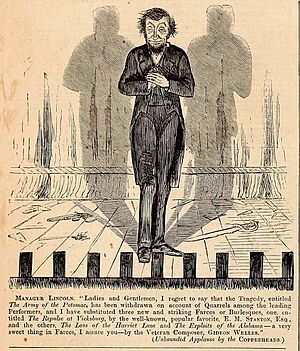
"Four score and seven years ago our fathers brought forth on this continent, a new nation, conceived in Liberty, and dedicated to the proposition that all men are created equal. Now we are engaged in a great civil war, testing whether that nation or any nation so conceived and so dedicated, can long endure. We are met on a great battle-field of that war. We have come to dedicate a portion of that field, as a final resting place for those who here gave their lives that that nation might live. It is altogether fitting and proper that we should do this. But, in a larger sense, we can not dedicate, we can not consecrate, we can not hallow, this ground. The brave men, living and dead, who struggled here, have consecrated it, far above our poor power to add or detract. The world will little note, nor long remember what we say here, but it can never forget what they did here. It is for us the living, rather, to be dedicated here to the unfinished work which they who fought here have thus far so nobly advanced. It is rather for us to be here dedicated to the great task remaining before us — that from these honored dead we take increased devotion to that cause for which they gave the last full measure of devotion — that we here highly resolve that these dead shall not have died in vain — that this nation, under God, shall have a new birth of freedom — and that government of the people, by the people, for the people, shall not perish from the earth."
After Fredericksburg, Lincoln replaced Burnside with General Joseph Hooker. As the war continued, Lincoln signed the Enrollment Act. This law started the first military draft in U.S. history. The draft was very unpopular and led to riots in places like New York City.
In April 1863, Hooker began an offensive towards Richmond. His army met Lee's at the Battle of Chancellorsville. The Union suffered another major loss. Following this victory, Lee decided to attack the North, launching the Gettysburg campaign in June 1863. Lee hoped that victories would weaken Lincoln's support. Lincoln replaced Hooker with General George Meade.
The Confederate and Union armies met at the Battle of Gettysburg on July 1. This three-day battle resulted in the most casualties of the war. The Union victory, along with the Siege of Vicksburg, is seen as a turning point in the war. Lincoln was disappointed that Meade did not destroy Lee's army, but he kept Meade in command.
In November 1863, Lincoln gave his famous Gettysburg Address. He dedicated a national cemetery to the fallen soldiers. In this short speech, Lincoln said the nation was founded on liberty and equality for all. He declared that the war was about a "new birth of freedom" and that "government of the people, by the people, for the people, shall not perish from the earth."
Lincoln had less direct control over the war in the West. General Ulysses S. Grant quickly gained Lincoln's attention. Grant won important victories at the Battle of Fort Henry and the Battle of Fort Donelson. In April 1862, U.S. Naval forces captured New Orleans. Grant's victories at the Battle of Shiloh and the Siege of Vicksburg secured Union control of the Mississippi River. These were major turning points in the war.
In October 1863, Lincoln made Grant the commander of the Western Theater. Grant and other generals led the Union to another victory at the Third Battle of Chattanooga. This drove Confederate forces out of Tennessee. The capture of Chattanooga opened the way for an attack on Georgia.
In April 1861, Lincoln announced a naval blockade of all Southern ports. This meant commercial ships could not get insurance, and regular trade stopped. The South could export very little cotton, which hurt their economy. The Confederate Navy tried to challenge the Union with an ironclad warship, the CSS Virginia. However, the Union built its own, the USS Monitor, which stopped the threat. The blockade was very effective. It cut off the Confederacy's main source of income and made critical imports scarce.
Grant Takes Command: The Final Push
Lincoln admired Grant's fighting spirit. In March 1864, Grant was called to Washington to become general-in-chief of all Union armies. Lincoln also brought back the rank of Lieutenant General for Grant, a rank not held since George Washington. Grant's new strategy focused on destroying Confederate armies. He ordered Meade to defeat Lee's army and General William Tecumseh Sherman to capture Atlanta.
Grant began his Overland Campaign, which involved very heavy fighting and many casualties on both sides. Despite the high losses, Lincoln continued to support Grant. Meanwhile, General Sherman led Union forces from Chattanooga to Atlanta. Sherman's victory in the Battle of Atlanta in September boosted Union morale.
Sherman then began his "Sherman's March to the Sea." His army marched through Georgia, destroying Confederate infrastructure. He reached the Atlantic Ocean at Savannah in December 1864. Sherman then turned north to approach Lee's army from the south.
During the Valley Campaigns of 1864, Confederate General Jubal Early attacked Washington, D.C. Lincoln watched some of the fighting from an exposed position. Grant then put General Philip Sheridan in command of the Union Army of the Shenandoah. Sheridan quickly pushed Early back and stopped Confederate guerrilla attacks.
The Election of 1864
After Republican losses in earlier elections, Lincoln felt pressure to end the war. For the 1864 election, he urged Republicans to use a new name: the National Union Party. This was to attract Union supporters from both parties. Lincoln's re-nomination was not guaranteed, as no president had won a second term since Andrew Jackson in 1832.
Some abolitionists wanted a different candidate, but most eventually supported Lincoln. In June 1864, the National Union Convention nominated Lincoln for president. They chose Andrew Johnson, a Southern War Democrat, as his running mate. This was to appeal to a wider range of Union supporters. The party called for the complete surrender of the Confederacy.
By August, many Republicans feared Lincoln would lose the election. Lincoln even wrote a pledge that if he lost, he would still work to defeat the Confederacy before leaving office.
Lincoln's chances improved after the Union Navy captured Mobile Bay. General Sherman's capture of Atlanta a few weeks later further boosted morale. The Democrats nominated General George McClellan for president. They called for peace, but McClellan himself wanted to continue the war.
Confederate leaders hoped a McClellan victory would lead to peace talks. However, Lincoln won a major victory, taking 55% of the popular vote and 212 of 233 electoral votes. Republicans also won strong majorities in Congress.
Confederate Surrender: The War Ends
After the Overland Campaign, Grant's army reached Petersburg, starting the Siege of Petersburg in June 1864. Lee's Confederate army was shrinking with each battle. Lincoln and the Republican Party worked to replace Union losses through the draft.
As Grant continued to wear down Lee's forces, talks about peace began. In February 1865, Lincoln and Seward met with Confederate representatives at the Hampton Roads Conference. Lincoln's position was firm: the Confederacy must disband its armies and rejoin the Union. This included accepting the Union's decisions on slavery. However, the Confederates would not agree, and the meeting ended without results.
Grant's army continued to fight in the trenches around Petersburg. On April 2, Grant launched an attack that forced Lee to retreat from Petersburg and Richmond. Lincoln visited the captured Confederate capital. As he walked through the city, formerly enslaved people greeted him as a hero. On April 9, Lee surrendered to Grant at Appomattox. The war was effectively over. Other Confederate armies soon surrendered as well.
Slavery and Reconstruction: A New Nation
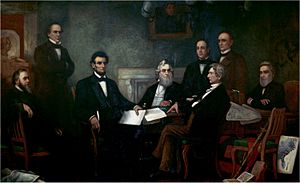
Early Actions on Slavery
For the first year and a half of his presidency, Lincoln stated that the war was to save the Union, not to end slavery. However, he considered different plans for ending slavery over time. This included the idea of paying slave owners to free their enslaved people. He also met with Frederick Douglass and other Black leaders to discuss moving formerly enslaved people to Central America. Abolitionists criticized Lincoln for not moving faster to end slavery.
In an August 1862 letter, Lincoln explained his main goal:
I would save the Union. I would save it the shortest way under the Constitution. The sooner the national authority can be restored; the nearer the Union will be "the Union as it was".... My paramount object in this struggle is to save the Union, and is not either to save or to destroy slavery. If I could save the Union without freeing any slave I would do it, and if I could save it by freeing all the slaves I would do it; and if I could save it by freeing some and leaving others alone I would also do that.
As the war continued, freeing enslaved people became an important way to weaken the rebellion. In August 1861, Lincoln signed the Confiscation Act of 1861. This law allowed the government to take enslaved people from anyone helping the Confederacy. In April 1862, slavery was abolished in Washington, D.C. In June, it was abolished in all federal territories. The next month, Lincoln signed the Confiscation Act of 1862. This law declared that all Confederate enslaved people who reached Union lines would be free.
The Emancipation Proclamation
Union victories in 1861 and 1862 helped secure the border states. This allowed Lincoln to take stronger actions against slavery. Many Northerners also began to support abolition during the war. In July 1862, Lincoln privately decided to make emancipation a war goal. He believed that as commander-in-chief, he could free enslaved people in rebellious states as a military measure.
On July 22, 1862, Lincoln showed his cabinet a draft of a proclamation. It called for freeing all enslaved people in the Confederacy. After a Union victory at the Battle of Antietam, Lincoln issued the Preliminary Emancipation Proclamation on September 22, 1862. It stated that enslaved people in any rebellious states would be free on January 1, 1863.
Lincoln kept his promise. On January 1, 1863, he issued the Final Emancipation Proclamation. It declared enslaved people free in the ten states still in rebellion. The proclamation did not cover enslaved people in the border states that stayed with the Union. It also exempted Tennessee and parts of Louisiana under Union control. Despite these limits, the Emancipation Proclamation added a new purpose to the war: ending slavery as well as restoring the Union.
Reconstruction: Rebuilding the Nation
As Southern states were brought back under Union control, important decisions had to be made about their future. Louisiana became a key area for discussing Reconstruction plans. Military governors there set up a system where formerly enslaved Black people worked on plantations for wages. This model was used in much of the occupied South. Louisiana also adopted a new state constitution that banned slavery.
After 1862, some Democrats wanted to withdraw the Emancipation Proclamation. They also wanted to offer forgiveness to Confederates. In contrast, Radical Republicans argued that Southerners who rebelled had lost many rights. Lincoln tried to find a middle ground with his "ten percent plan." This plan called for freeing Confederate enslaved people. It also allowed Southern states to rejoin the Union once 10% of their voters pledged loyalty and respected emancipation.
Radical Republicans proposed the Wade–Davis Bill. This plan included protections for the rights of formerly enslaved African Americans. It also required 50% of voters to swear an "Ironclad Oath" that they had never supported the rebellion. Lincoln disagreed with this bill because it interfered with his plans for Louisiana and Arkansas. He used a pocket veto to stop it in late 1864.
Lincoln and congressional Republicans continued to disagree on Reconstruction after the 1864 election. Many in Congress wanted big changes to Southern society beyond just ending slavery. They refused to recognize Lincoln's new Southern governments. As the war ended, Lincoln showed openness to some Radical Republican ideas. He signed a bill creating the Freedmen's Bureau. This temporary agency provided food and supplies to formerly enslaved Black people. It could also grant confiscated land to them. Lincoln did not take a firm stand on black suffrage (the right to vote for Black people). He only suggested that "very intelligent blacks" and those who served in the military should be allowed to vote.
Historians note that no one knows exactly what Lincoln would have done for Reconstruction if he had served his full second term. However, he often came to support ideas first suggested by abolitionists. It is likely he would have worked with Congress to protect basic civil rights and allow some Black people to vote.
The Thirteenth Amendment: Ending Slavery Forever
In December 1863, a proposed constitutional amendment to outlaw slavery was introduced in Congress. The Senate approved it, but it did not get enough support in the House. When Lincoln accepted his nomination in 1864, he promised to work for a constitutional amendment to abolish slavery. After winning re-election, Lincoln made passing the Thirteenth Amendment a top priority. He believed this would permanently end slavery in the United States.
Lincoln gave his full attention to getting the amendment ratified. He urged the current Congress to approve it as soon as possible. After a lot of effort by Lincoln and Seward, the House narrowly passed the amendment with the required two-thirds majority. The Thirteenth Amendment was then sent to the states for approval. It was officially adopted on December 18, 1865. With its ratification, many abolitionists felt their work was done. However, Frederick Douglass believed that true freedom would only come when Black men had the right to vote.
Other Domestic Issues and Reforms
Before the Civil War, Southern lawmakers had blocked many economic plans. These included federal money for roads and canals, support for higher education, and higher tariffs (taxes on imported goods). With Southern states gone, Republicans controlled Congress. They were free to pass their economic agenda. Lincoln believed Congress should write laws and the president should enforce them.
The 37th and 38th Congresses passed many new laws. Many of these were to raise money for the war. Federal expenses increased seven times in the first year of the Civil War.
Funding the War: Fiscal and Monetary Policy
After Fort Sumter, Lincoln and Secretary of the Treasury Salmon Chase faced the challenge of funding the war. Congress quickly approved Lincoln's request for a large army. However, they were slow to raise taxes at first. After the defeat at Bull Run, Congress passed the Revenue Act of 1861. This law created the first federal income tax in U.S. history. It was a 3% tax on incomes over $800. This tax mostly affected wealthy people.
Lincoln also signed the second and third Morrill Tariffs. These laws greatly increased taxes on imported goods. They were designed to raise money and protect American manufacturing. These tariffs remained high for the rest of the 19th century.
The early tax measures were not enough to fund the war. In February 1862, Congress passed the Legal Tender Act. This allowed the government to print $150 million in "greenbacks." Greenbacks were paper money not backed by gold or silver. They were backed by the government's promise to honor their value. By the end of the war, $450 million in greenbacks were in circulation. Congress also passed the Revenue Act of 1862. This law added an excise tax on many goods and the first national inheritance tax. It also made the income tax progressive, meaning higher earners paid a higher percentage.
Funding the war remained difficult. The national debt grew from $65 million in 1860 to $2 billion in 1866. Congress passed more tax increases in 1864 and 1865. By the end of the war, the income tax provided about one-fifth of the federal government's revenue.
Lincoln also fought against fraud during the war. He enacted the False Claims Act in 1863. This law, known as the "Lincoln Law," allowed private citizens to sue contractors who defrauded the government. It protected the U.S. government from companies providing faulty goods to the army. This law is still used today to prevent fraud.
To stabilize the currency, Congress passed the National Banking Act in 1863 and 1864. These laws created "national banks" that were regulated by the federal government. These banks could issue federal banknotes if they invested in federal bonds. After a tax was placed on private banknotes in 1865, federal banknotes became the main form of paper money.
Important Reforms and New Institutions
Many laws passed during Lincoln's presidency created long-term reforms. The Homestead Act of May 1862 made millions of acres of government land in the West available cheaply. Settlers could get 160 acres if they developed the land for five years. The Morrill Land-Grant Colleges Act, also in 1862, provided federal land grants for agricultural colleges in each state. Another 1862 law created the United States Department of Agriculture to help farming. The Pacific Railway Acts of 1862 and 1864 supported the building of the First transcontinental railroad, completed in 1869.
In June 1864, Lincoln approved the Yosemite Grant. This law protected the area now known as Yosemite National Park. Lincoln is also largely responsible for making Thanksgiving a national holiday. In 1863, he declared the last Thursday in November a day of Thanksgiving.
Domestic Dissent and Confederate Sympathizers
After the attack on Fort Sumter, Lincoln suspended habeas corpus. This allowed him to imprison suspected Confederate sympathizers. The federal government worked to stop those actively supporting the Confederacy. Chief Justice Taney argued that only Congress could suspend habeas corpus. Lincoln responded that his actions were necessary due to the war. Congress later passed a law in 1863 that authorized the president to suspend habeas corpus.
As the war continued, many Northerners resisted the sacrifices required. Recruiting declined. When state efforts failed to provide enough troops, Congress started a draft in March 1863. The draft was unpopular, especially among Irish Americans and urban workers. The New York City draft riots in July 1863 saw mobs attack soldiers, police, and African Americans. Lincoln had to send soldiers from the Gettysburg Campaign to stop the riots.
Clement Vallandigham, a Democrat from Ohio, was a strong critic of the war. General Burnside arrested him in May 1863 for criticizing the draft. Lincoln intervened and had Vallandigham released into Confederate territory. However, Vallandigham's defeat in the 1863 Ohio governor's election showed public support for the war.
Native American Relations During the War
Conflicts with Native Americans continued in the West during the Civil War. In 1862, Lincoln sent General Pope to stop the "Sioux Uprising" in Minnesota. Lincoln personally reviewed 303 execution warrants for convicted Santee Dakota and approved 39 for execution. Lincoln called for reforms in federal Indian policy, but the war remained his main focus.
In May 1864, Cheyenne leaders, including Lean Bear and Black Kettle, were camping peacefully. Lean Bear, who had met Lincoln, wore a peace medal and carried a document signed by Lincoln. However, U.S. troops under Lieutenant George Eayre were ordered to "kill Cheyennes whenever and wherever found." Eayre's men shot and killed Lean Bear.
On November 29, 1864, Colonel John Chivington and his troops attacked a village of Cheyenne and Arapaho people in Colorado. This event, known as the Sand Creek massacre, resulted in the deaths of about 150 Native Americans, mostly women and children. The Sand Creek Massacre led to calls for reforms in Indian policy after Lincoln's death.
New States Join the Union
Two new states joined the Union during Lincoln's presidency. The first was West Virginia. It had been part of Virginia before the Civil War. In June 1861, delegates from western Virginia formed a new government. The people of West Virginia voted to separate from Virginia. Lincoln supported their actions and signed a bill admitting West Virginia as a state on June 20, 1863.
The second state was Nevada. Congress approved a law in March 1864 allowing Nevada Territory to form a state government. Nevada became a state on October 31, 1864.
Foreign Policy: Keeping Europe Neutral
Lincoln appointed his main political rival, William H. Seward, as Secretary of State. Seward handled most diplomatic issues. Lincoln closely watched events like the Trent Affair to avoid war with Britain. Seward's main goal was to prevent Britain and France from supporting the Confederacy. He succeeded by making it clear that the U.S. would declare war if they did.
Both the U.S. and the Confederacy knew that European support could greatly help the South. At the start of the war, Russia was the only major power to support the Union. Other European powers had some sympathy for the Confederacy. However, all foreign nations officially remained neutral throughout the Civil War. None recognized the Confederacy as an independent country.
European leaders saw the division of the U.S. as a chance to weaken a growing rival. They looked for ways to take advantage of the U.S. being busy with its own war. Spain invaded the Dominican Republic in 1861. France set up a puppet government in Mexico. However, many in Europe also wanted the Civil War to end quickly due to its economic impact.
Lincoln's foreign policy initially struggled to gain European public support. European leaders often saw the American conflict as proof that democracy had failed. U.S. diplomats had to explain that the U.S. was not fighting to end slavery at first. Confederate spokesmen were more successful by focusing on their fight for liberty and free trade. However, the Confederacy's hope that cotton exports would force Europe to intervene did not happen. Britain found other sources of cotton.
The Emancipation Proclamation changed European public opinion. It added the abolition of slavery as a Union war goal. This rallied European support for the Union. Any chance of European intervention ended with Union victories at Gettysburg and Vicksburg. European leaders then believed the Confederate cause was doomed.
Britain and the Civil War
Important people in Britain often favored the Confederacy. However, the general public tended to support the United States. Trade continued between the U.S. and Britain. The U.S. sent grain to Britain, while Britain exported manufactured goods and weapons. British trade with the Confederacy was limited.
A serious diplomatic problem arose in late 1861. The Union Navy stopped a British ship, the Trent, and seized two Confederate envoys heading to Europe. This caused outrage in Britain. Lincoln ended the crisis, known as the Trent Affair, by releasing the diplomats. He admitted they had been seized illegally.
British shipyards built warships for the Confederacy, like the CSS Alabama. The U.S. strongly protested this. After the war, this led to the Alabama Claims. An international court ordered Britain to pay the U.S. $15.5 million for damages caused by these ships.
France and the Civil War
Emperor Napoleon III of France wanted to rebuild a French empire in North America. He saw Mexico as the center of this new empire. In December 1861, France invaded Mexico. They eventually set up a puppet government under Maximilian I of Mexico.
In October 1862, Napoleon III suggested a ceasefire and joint mediation of the American Civil War by France, Britain, and Russia. He feared a reunited U.S. would threaten his Mexican empire. However, other European powers declined his proposal. The U.S. refused to recognize Maximilian's government. It threatened to drive France out of Mexico but did not get directly involved during the Civil War.
After the American Civil War ended in 1865, the U.S. increased pressure on France to leave Mexico. France withdrew its forces in 1866. Maximilian was captured and executed in 1867.
Assassination: A Tragic End
Shortly after 10:00 p.m. on April 14, 1865, President Lincoln was assassinated. He was watching a play called Our American Cousin at Ford's Theatre with his wife and two guests. John Wilkes Booth, an actor and Confederate supporter, shot Lincoln in the back of his head. The badly wounded president was taken across the street to Petersen's Boarding House. He passed away there at 7:22 a.m. the next morning.
Booth had also planned with others to kill Secretary of State Seward and Vice President Johnson. They hoped to create chaos and help the Confederate cause. Booth succeeded in killing Lincoln, but the larger plot failed. Seward was attacked but recovered. Johnson's attacker lost his nerve and fled. With Johnson unharmed, he became the 17th President of the United States.
Lincoln's body was honored in the White House and then at the Capitol Rotunda. His funeral train then traveled a long route, similar to his journey as president-elect. He was buried at Oak Ridge Cemetery in Springfield on May 4.
Historical Reputation and Legacy
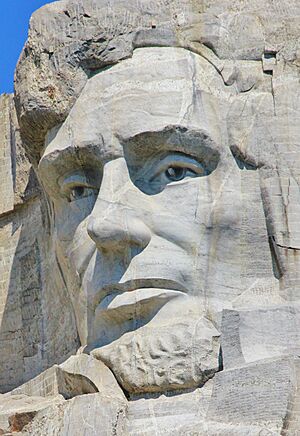
In surveys of U.S. historians and scholars, Lincoln is consistently ranked among the top three presidents. He is often considered the greatest president in American history. Since 1948, he has been rated number one in most polls. He is usually ranked alongside George Washington and Franklin D. Roosevelt.
Redefining American Values
The Union's victory in the Civil War changed the country. Before the war, the term "the United States" was sometimes used as plural. After the war, it became mostly singular, showing a more unified nation. The Civil War and the Reconstruction Amendments (passed after Lincoln's death) changed the Constitution. The Union victory ended debates about whether states could leave the Union. Besides ending slavery, the Reconstruction Amendments promoted racial equality.
Historians emphasize how Lincoln redefined American values. In the 1850s, political talk focused on the Constitution. Lincoln shifted attention to the Declaration of Independence as the basis of American values. He called it the "sheet anchor" of republicanism. The Declaration's focus on freedom and equality for all, unlike the Constitution's tolerance of slavery, changed the discussion. Lincoln highlighted the moral reasons for a republic, not just the legal ones. His ideas were later embraced by formerly enslaved people as they gained freedom.
Images for kids
See also
 In Spanish: Presidencia de Abraham Lincoln para niños
In Spanish: Presidencia de Abraham Lincoln para niños
 | Calvin Brent |
 | Walter T. Bailey |
 | Martha Cassell Thompson |
 | Alberta Jeannette Cassell |


